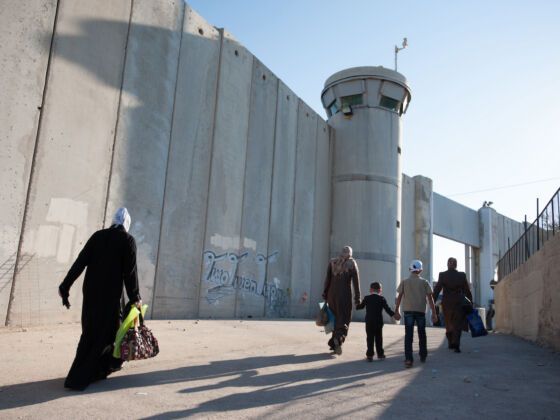After a year in Israel and Palestine, I find I understand this place far less than when I first arrived. I’ve lived in the north and in Jerusalem. I’ve worked with Jewish and Arab-Israeli youth. I’ve been involved in dialogue projects based on education, media, music, and religion (through the Palestine-Israel Journal and Religions for Peace). I have Palestinian friends in Ramallah, Israeli friends who are activists, Palestinian friends in Jerusalem, and Israeli friends in settlements. I cross back and forth, back and forth. I have no conclusions — only memories, friendships, and stories.


What I Know to Be True in Israel and Palestine
Suli wears a checked shirt. His dark curls hang close to his black eyes that glint with silver. He leans on the bar. He roles his Rs when he talks with his rhythmic Arabic accent. He talks about a woman in Argentina. About his family and their house with olive groves and fresh goat cheese. About the ten years he spent in prison for trying to stab an Israeli soldier. He was fourteen.
“It was nothing to do with Allah or Mohammed,” he says, “It was for freedom.”
He’s changed a lot between 14 and 40. Suli has Israeli friends. Not the kind of friends you talk to when you pass on the street — the ones you laugh with and sometimes get drinks with — but the friends you build a path with, walk together with, towards something, sharing the ups and downs along the way.
Now he talks of al-Somood — of standing peacefully steadfast in their land like olive trees. Of Gandhi living in the hearts of people who’ve never heard of him. Of non-violence. Of anger being easier — you just react. But it’s not the world he wants. And he’s looked into the eyes of the other. He’s seen pain in their eyes. Heard their stories. And he can’t go back now.
When asked about Ramallah, he talks about a time with his soldiers when they went to rescue a woman who was being beaten by Palestinian police. She was bruised and bloody all over. Her crime was that she’d tried to visit her daughter after she and her husband had become divorced.
A week later his tiger stone eyes saw her saw again. Avner’s eyes now narrow as he talks and he turns his head to the side,“She was dead. Hanging upside down. She’d tried to visit her daughter again.”
When asked if he’s ever killed, he says, “Three times.” He waits for a moment, trying to guess how I will judge him, feeling for my thoughts with his gaze, wondering if I will hear.
Then Avner starts slowly, “I remember the first time very intensely. It’s very clear, very real. It was a protest. We’d been told to let the protesters spill their energy and then it would calm down. But then we saw a man hide behind a car. My officer tells me to look to see if he has a weapon. I say I think I see something but I’m not sure. My officer says to keep an eye on him. Then the man appears on the other side of the car pointing a large gun at us. So I shot.”
His eyes are steady, rippled with light and dark. “It’s very easy to kill.”
Ali’s brother was killed.
He was shot by a soldier from a distance of 70cm. Ali doesn’t say why. Or maybe he does but it gets lost in the look in his grey eyes that’s there even though he’s told the story so many times before.
Then Ali’s eyes come back to the people in front of him. He looks right into us and says, “No land is worth more than life.”
These stories of violence lie on top of each other, staining each other, scarring each other. Together their weight is too heavy. And when the rocket sirens sound, these scars are picked at, opened, and they leak out into hate. And people stop meeting, stop sharing their stories. They want to protect themselves. To keep their hearts safe.
One side raises its glasses, saying, “To our soldiers!”
The other side says, “Fuck the occupation!”
But one miracle seems to be hers. This miracle happened when soldiers were in her house, preparing to detonate small bombs. She spoke to the commander. Christine asked him if he had children. He said yes. She asked him what he would do if she pointed a gun at his children’s heads. He shouted at her. He got angry and said he would kill her before she got anywhere near his family’s house.
“You are in my family’s house,” she said, almond eyes wide, even as she remembers. “Your soldiers have pointed guns at my children’s heads. And I haven’t killed you. I am asking you, politely, not to make explosions with my children at home.” The commander paused. A female soldier was planting the devices. The commander looked away, confusion in his eyes. The female soldier was speaking to him when he suddenly told her to stop.
It was then that I realized maybe it was one story after all. One human story of people caring for those they loved. There are cracks in The Wall where voices meet and hear the echoes of their own fears and hopes.